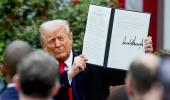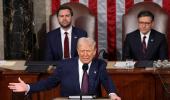If Beijing succeeds in this multipronged effort to challenge the current dominant power, it will have not just economic but political and security consequences.
There is no let-up in the South China Sea nor any de-escalation moves on the India-China border.
This portends to ominous signalling from Beijing, observes China expert Srikanth Kondapalli.

The China-US self-destructive and high-intensity tariff war is an opportunity for India to restructure its industrial and financial markets and intensify high grade trade liberalisation arrangements with advanced economies.
Ever since the April 2 'Liberation Day' surprise imposition of United States tariffs and reciprocal tariffs on a number of countries, the global economic situation is taking a dent with major impact on stock exchanges, currencies, exports and imports, growth rates, employment, savings and others.
As a 90-day reprieve was announced for many a country, except China, one should expect some negotiations and resettlements.
Nor for China.
For, China is the only country in the world that not only retaliated against the US tariffs -- an approach some depicted as a 'game of chicken' -- but also expanded the conflict by banning the export of rare earth metals like germanium, gallium, terbium and others crucial for the US tech industry, restricted 60 US companies and even films.
China's officials depicted President Trump's tariffs as a 'joke', 'bullying' or even 'arrogant and shameless' and vowed to hit back at the US.
China intends to diversity trade, reduce dependence on SWIFT transactions, divest in US treasury securities (currently holding $760 billion) and increase the pain on the US.
This is a drastic shift from Deng Xiaoping's 'keeping a low profile' to Xi Jinping's 'accomplish something' approach.
President Trump effectively imposed 145 percent tariffs on China while the latter retaliating by 125 percent on US goods.

China is more exposed to external trade and thus the impact on China will be drastic. In 2023, China exported $3.4 trillion worth of goods, while the figures for the US stood at $2 trillion and $432 billion for India.
While China bought $143 billion worth of goods from the US in 2024, it sold $439 billion to the US, thus making $296 billion. These figures will dwindle.
Even if China diverts its surplus goods elsewhere, the consequences of such actions go beyond economics.
China has criticised tariffs by saying that it will increase the cost for American consumers.
It did not explain its unrelenting mercantilist policies that precipitated the current situation.
It does not cooperate on fentanyl exports to the US that kill 100,000 Americans a year. Nor did it say how Chinese producers and consumers will be affected.
Slump in trade figures will have a cascading effect. It is estimated that 80 percent of Chinese shipping to the US is expected to slump.
Goldman Sachs estimated that tariff wars could lead to decline in China's GDP to 4 percent while leaving about 20 million unemployed.
This is complicating for China given the already existing deflationary pressures, real estate bubble, mounting local debt and economic headwinds. Business sentiment on China is likely to be hurt, having a downward slide in investments.
China took recourse to a highly negative 'whole of the nation' approach with Communist party cells, businesses and civil society active all over the country and abroad.
It had whipped up nationalism and meme propaganda campaigns against Trump's MAGA movement. It invoked Mao Zedong's 1953 video clipping on defying the US.

In an effort to implement its 'magical weapon' of a united front, China is in touch with Saudi Arabia and South African leaders, besides Xi visiting Vietnam, Cambodia and Malaysia this week.
Beijing also alerted many countries to fight against the tariffs and defend the multilateral economic system.
Xi told visiting Spanish Prime Minister Pedro Sanchez that China and Europe should 'jointly oppose unilateral acts of bullying'.
To overcome the loss in exports, it wants to encourage domestic consumption, even though it is limited at less than 53 percent, compared to 68 percent for the US and 60 percent for India.
While China has the highest savings rates at 46 percent, citizens do not want to spend given the periodic political turmoil in the country, banking crisis, stock fluctuations and the recent debilitating pandemic lockdowns.
China's currency declined to a record low of 7.4 yuan per dollar to support exports but may not see further devaluation due to fear of capital outflows.
Shanghai's and Hong Kong stock exchanges were hit, though recovered later, wiping out investors, mainly young cohorts, savings.
The last decade of estranged relations with the US resulted in no comprehensive communication channels between the two leaders and officials.
With sanctions on US Secretary of State Marco Rubio, China has alienated a crucial channel of communication.
Trump invited Xi to his inauguration, which was eventually attended by Vice President Han Zheng.

China stated that it is the leader of 'globalisation' and defender of free trade. It had announced zero tariffs to over 30 African countries but others feel the pinch with dumping of Chinese goods, non-tariff barriers, lack of investments or other discriminations.
China also heavily subsidises its industry and exports, providing unfair advantage to its companies.
India, for instance, lost over $1.4 trillion in balance of trade to China in the last two decades, while last year the trade deficit climbed to $83 billion.
Thus, the full-blown tariff war between the two largest economies in the world is a reflection of China's attempt to force a power transition at the global level.
If Beijing succeeds in this multipronged effort to challenge the current dominant power, it will have not just economic but political and security consequences.
If China succumbs in this contest with the US, it may take over a decade or two to encash 'great changes unseen in a century' that Xi formulated in his discussions with Russia.
While the global attention has been on economic turmoil, China is also ratcheting up in Taiwan Straits with massive military exercises.
There is also no let-up in the South China Sea nor any de-escalation moves on the India-China border. This portends to ominous signalling from Beijing.
Srikanth Kondapalli is Professor in Chinese Studies at JNU.
Feature Presentation: Aslam Hunani/Rediff.com











 © 2025
© 2025